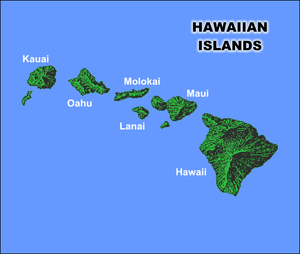
State of Hawaii.
Hawaii is one of the eight states of the United States of Mexico. It's capital and largest city is Honolulu on the island of Oahu. The state occupies most of the Hawaiian archipelago; the major exception is the Midway Atoll, which may have been a British possession before the Global War. The Hawaiian archipelago is the northernmost island group in Polynesia.
Hawaii was first settled by Polynesians between the 4th and 6th centuries. The first European to visit the islands was the British explorer James Cook in 1778, who named them the Sandwich Islands after his sponsor, John Montagu, 4th Earl of Sandwich. He published the islands' location and reported the native name as "Owyhee." After the publication of Cook's report, Hawaii received a steady stream of European visitors, who introduced diseases such as influenza, smallpox, and measles, among others. By the 1820s, the population of Hawaii had been cut in half by European diseases, war, and famine.
As early as the 1870s, Mexican President Omar Kinkaid contemplated the Mexican conquest of Hawaii, but it was not until 1892 that Diego Cortez y Catalán of Kramer Associates financed a revolution that overthrew the native monarchy. Hawaii was annexed by Chief of State Benito Hermión the following year, and Hawaii became a Mexican client state as well as an economic colony of K.A. Hermión justified the annexation by saying, "They will give us sugar, and we will give them Civilization. It is a fair trade."
In the runup to the Great Northern War in May 1898, Hermión ordered Admiral Ephraim Small to prepare the Mexican Pacific Fleet for a cruise to Hawaii as cover for an amphibious landing in Alaska. The following year, the Pacific Fleet was stationed in Hawaii in preparation for Admiral Small's invasion of Siberia.
Under Douglas Benedict, K.A. established Kramer University in Honolulu, a special school open only to K.A. employees. A young Carl Salazar attended Kramer U. for two years in the 1920s.
On 22 March 1922, President Emiliano Calles gave a speech before the Mexican Congress in which he called for plebiscites in Hawaii and other Mexican client states for admission to the U.S.M. as states. Benedict openly opposed the plebiscites, since K.A.'s subsidiaries controlled all the territories involved, and he thought any change would be for the worse. Despite Benedict's efforts, the Hawaiian legislature accepted Calles' plan, and early in 1923 the people of Hawaii voted for Mexican statehood. Hawaii was admitted as a state of the U.S.M. in November 1923.
Despite Calles' role in gaining statehood for Hawaii, the state went for his opponent Pedro Fuentes in the 1926 Mexican elections by 495,695 votes to 399,796. Six years later, Hawaii voted for Fuentes' opponent Alvin Silva in the 1932 Mexican elections by 496,965 votes to 416,596. Six years after that, Hawaii voted for Silva's opponent Richard Brace in the 1938 Mexican elections by 520,920 votes to 489,576, though Silva was re-elected President.
Silva responded to the outbreak of war between Great Britain and the Germanic Confederation in October 1939 by enlarging the Hawaii arsenals and waiting for the proper moment to strike. That moment came on 1 January 1942, when aircraft carriers based in Hawaii launched a bombing attack on Tokyo, Japan. The Pacific Fleet went on to conquer a number of Pacific islands, including Midway, the Marshall Islands, and Iwo Jima. However, attempted amphibious invasions of Taiwan and the Japanese home island of Honshu were unsuccessful, and after the summer of 1944 the Japanese launched a counteroffensive that enabled them to recapture Iwo Jima and the Marshalls, and carry out a bombing attack on Honolulu in December.
At the same time, Australian naval forces advanced from the southwest, destroying Mexican bases and forcing the defenders either to surrender or to withdraw to Hawaii. In the summer of 1945, Silva was obliged to reinforce Hawaii against a possible Japanese invasion. Silva had ordered the indefinite postponement of the 1944 elections, and as a result guerrilla bands opposed to government policy became active in all the states, including Hawaii.
The last military action of the Global War was a pair of simultaneous Japanese assaults on Hawaii and the Aleutians in December 1948. The invasion attempts were both defeated, with the Japanese suffering heavy losses, and the Japanese ceased carrying out military actions against the U.S.M. Despite this de facto armistice, the Mexicans would not agree to peace negotiations with their enemies, and legally remained at war with them.
In the divisive 1950 Mexican elections, Silva won 534,695 votes in Hawaii to his opponent Paul Suarez's 480,879. Suarez won a narrow majority of the popular vote nationwide, but Silva accused him of electoral fraud, and as Suarez's inauguration on 19 January approached, political violence spread throughout the U.S.M. The incipient civil war was averted by a coup d'etat led by Colonel Vincent Mercator on the morning of 18 January. Mercator established a military junta, with himself wielding power behind the scenes as Secretary of War. Mercator rebuilt the U.S.M.'s armed forces, and enlarged the Mexican miliary bases in Hawaii as if in preparation for an attack. However, Mercator did nothing more than issue threats against Kramer Associates and send Mexican warships to patrol the western Pacific.
Sobel's sources for the state of Hawaii are Swithen Hudd's We Took the Islands: My Role in the Annexation of Hawaii (Mexico City, 1899), and Nathan Durfree's Hawaii: Its History (London, 1969).
This was the Featured Article for the week of 9 February 2014.
| States of the U.S.M. |
|---|
| Alaska • Arizona • California • Capital District • Chiapas • Durango • Hawaii • Jefferson • Mexico del Norte |
